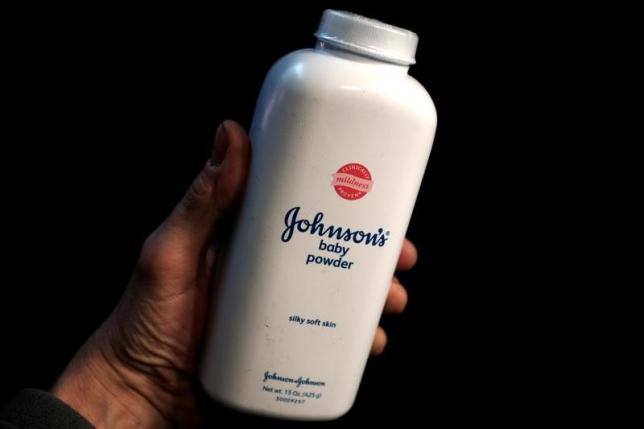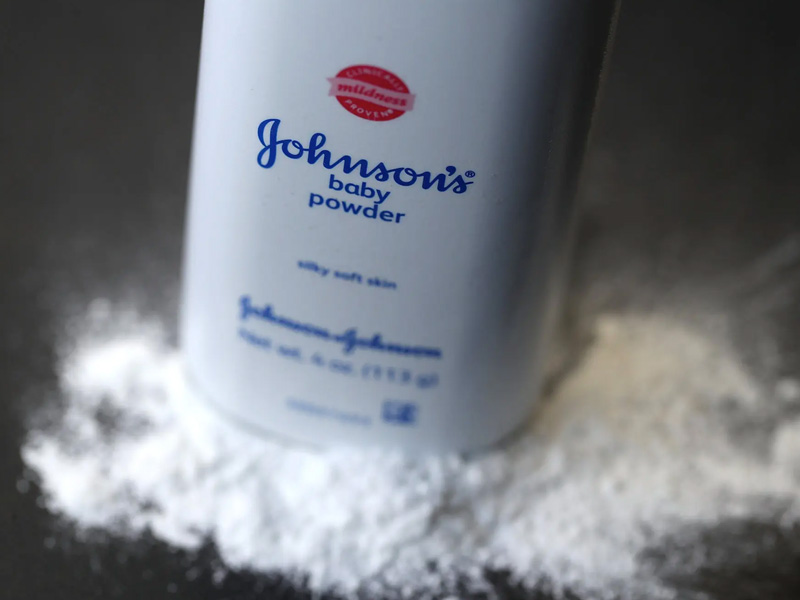Did You Develop Cancer after Talcum Powder Use?
Ovarian cancer and mesothelioma have been linked to Johnson & Johnson’s popular talc-based Baby Powder products. Lawsuits allege Johson & Johnson should be held liable. If you or a loved one have been diagnosed with Ovarian cancer after Talcum Powder use, you may qualify to join the Talcum Powder Lawsuit.

Start My Talcom Powder Claim Now
talcum powder Lawsuit
Ovarian cancer and mesothelioma have been linked to Johnson & Johnson's popular talc-based Baby Powder products.
Talcum powder is a seemingly harmless over-the-counter product used by many consumers to prevent rashes and keep skin free of moisture. However, mounting research shows that Johnson & Johnson’s popular baby powder and Shower-to-Shower absorbent body powder, as well as all other talcum powder products on the market in the United States, may actually be tied to an increased risk of ovarian cancer in women who use the powders in their genital area for personal hygiene purposes. If you have used J&J talcum powder or another type of talc-based body powder, and you have since been diagnosed with a potentially life-threatening disease like ovarian cancer, contact a reputable attorney in your area to discuss your legal options. You may have grounds to file a product liability lawsuit against Johnson & Johnson, in order to seek fair and timely reimbursement for your losses.
Talcum Powder Alternatives for Feminine Hygiene
As talcum powder is applied, talc particles become airborne and, when inhaled, can cause coughing, wheezing and, in some cases, a condition called talcosis, characterized by acute or chronic lung irritation. Talc-based powders marketed as body powders or feminine hygiene products have also been linked to an increased risk of ovarian cancer and other major side effects in women, caused by the talc particles traveling through the vagina, into the uterus and along the fallopian tubes to the ovaries. As a result, many women and parents are seeking safer and effective alternatives to talcum powder for infants and personal hygiene purposes, including the following natural products:
- Cornstarch
- Arrowroot powder
- Corn flour
- Rice flour
- Baking soda
- Chickpea powder
- Oat flour
What is Talcum Powder?
A soft, white powder used in cosmetics, baby powders and personal hygiene products that may lead to ovarian cancer and other serious side effects in users.
According to the American Cancer Society, talcum powder is made from talc, a mineral composed mainly of the elements silicon, magnesium and oxygen. As a powder, talc absorbs moisture well and helps cut back on friction, which makes it a useful product for keeping skin dry and preventing rashes. Because of its benefits, talc is widely used in a variety of consumer products, including baby powder and adult body and facial powders. In its natural form, some talc may contain asbestos, a dangerous substance known to cause a deadly type of cancer called mesothelioma when inhaled or ingested. However, all home-use talcum powders in the United States have been asbestos-free since the use of asbestos was widely restricted in the 1970s.
Possible Side Effects Leading to a Talcum Powder Lawsuit
Ovarian cancer is a type of cancer that arises from the cells of the ovary, most commonly the lining cells of the ovary. Unfortunately, ovarian cancer symptoms are very vague and there are currently no good screening tests for the disease. The most common symptoms of ovarian cancer include:
- Fatigue
- Becoming full quickly
- Leg swelling
- Abdominal swelling
- Changes in bowel and bladder habits
- Shortness of breath
Link Between Talcum Powder and Ovarian Cancer Side Effects
Although talc that contains asbestos is no longer available on the market, new research indicates that individuals who use talcum powder may still be at risk for cancer, namely ovarian cancer in women. Most concerns about a potential link between talcum powder and cancer involve women who regularly applied talcum powder to their genital area and who may now face an increased risk of ovarian cancer. Studies have suggested that talcum powder might play a role in the development of ovarian cancer if the powder particles (applied to the genital area, or on condoms, sanitary napkins or diaphragms) travel through the vagina, uterus and fallopian tubes to the ovaries. Numerous studies have examined the possible connection between talcum powder and ovarian cancer, and a federal jury in South Dakota ruled in October 2013 that a woman’s use of Johnson & Johnson products that contained talcum over the course of 30 years contributed to her ovarian cancer.
Lawsuits Against Talcum Powder for Ovarian Cancer and Other Injuries
October 2013 – A South Dakota jury rules against J&J in a lawsuit brought by a 56-year-old woman who developed ovarian cancer after using Shower-to-Shower body powder for three decades.
May 2014 – A class action lawsuit is filed on behalf of residents of Missouri who purchased talc-based baby powders during the previous five years, due to allegations that Johnson & Johnson failed to warn about the potential risk of ovarian cancer among women who use the powder for personal hygiene purposes.
May 2014 – A class action lawsuit is filed in Illinois, alleging that J&J continued marketing its talc-based baby powder as a safe and effective product for use among infants and women, despite growing concerns about the potential for talcum powder products to cause ovarian cancer.
May 2014 – A class action lawsuit is filed in California against Johnson & Johnson, seeking to force the company to provide adequate warnings to consumers about the possible health risks associated with the company’s talcum powder products.
June 2014 – A woman files a lawsuit against J&J for failing to warn consumers that its Baby Powder and Shower-to-Shower talcum powder products can increase the risk of ovarian cancer in women.
October 2014 – A lawsuit involving 65 women diagnosed with ovarian cancer after using talcum powder for feminine hygiene purposes is remanded back to state court in Missouri.
November 2014 – A wrongful death lawsuit is brought against J&J on behalf of a woman who developed ovarian cancer after using a talc-based body powder.
January 2015 – A federal judge in Missouri rules that Johnson & Johnson will face charges of conspiring to conceal the side effects of talcum powder in a lawsuit filed by the husband of a woman who died from ovarian cancer.
May 2015 – Colgate-Palmolive Co. is ordered to pay $13 million in damages to a woman who used an asbestos-containing talcum powder cosmetic product called “Cashmere Bouquet,” and was diagnosed with mesothelioma 40 years later.
October 2015 – Complaints involving 237 women who used talcum powder products and subsequently developed ovarian cancer have been sent back to state court in Missouri, after J&J lost a bid to transfer the cases to federal court.
June 2015 – The health news organization FairWarning reports that approximately 700 women have filed lawsuits over ovarian cancer allegedly caused by talc-based body powders.
FDA, Talc Powder and Side Effects
August 1993 – The Acting Associate Commissioner for Legislative Affairs of the Department of Health and Human Services states the following: “We are aware that there have been reports in the medical literature [of a link] between frequent direct female perineal talc dusting over a protracted period of years, and an incremental increase in the statistical odds of subsequent development of certain ovarian cancers…[However] at the present time, the FDA is not considering to ban, restrict or require a warning statement on the label of talc containing products.”
November 1994 – The Cancer Prevention Coalition petitions the FDA to issue a warning regarding the perineal use of talcum powder, due to the risk of ovarian cancer side effects. The petition is denied by the FDA, despite the fact that it is supported by 15 scientific publications.
1997 – Senator Edward Kennedy issues a statement to the Senate requesting that the FDA include a cancer warning on the label of talc-based products.
May 2008 – A large coalition of groups led by the Cancer Prevention Coalition submits a petition to the FDA, requesting that an ovarian cancer warning be added to talc-based body powders and other products.
March 2014 – The FDA updates information about the health risks allegedly associated with talcum powder on its website, indicating that “Talc is an ingredient used in many cosmetics, from baby powder to blush. From time to time, FDA has received questions about its safety and whether talc contains harmful contaminants, such as asbestos.” However, the FDA has yet to issue an official warning about the risk of ovarian cancer from talcum powder.
Talcum Powder Side Effect Studies
Link Between Talc Powders and Ovarian Cancer: Study
Researchers establish a potential connection between the dusting of female genitals with talc-based powder and a risk of ovarian cancer, indicating that particles of talc were deeply embedded in a majority of ovarian tumors.
1971Talcum Powder Linked to Ovarian Cancer in Study
The journal Cancer publishes a study linking the use of talcum powder to an increased risk of ovarian cancer, supporting the findings of previous research.
July 1982Talc Powder Use on Genitals Increases Ovarian Cancer Risk Threefold: Study
A woman’s frequent use of talcum powder on her genitals increases her risk of ovarian cancer by threefold, finds a study published in the medical journal Obstetrics and Gynecology.
July 1992Talc use in the abdominal or perineal region "positively associated with the occurrence of ovarian cancer"
The International Journal of Cancer reports in a case-control study involving more than 1,600 women diagnosed with epithelial ovarian cancer in Australia between August 1990 and December 1993, that the use of talc in the abdominal or perineal region is positively associated with the occurrence of ovarian cancer.
September 1995Cancer research: Talc exposure may increase risk of ovarian carcinoma
The journal Cancer reports that exposure to talc may increase the risk of ovarian carcinoma in women.
June 1997Link between talc and ovarian cancer: A call for more formal health warnings
A study published in the International Journal of Cancer finds that “there is a significant association between the use of talc in genital hygiene and risk of epithelial ovarian cancer that […] warrants more formal public health warnings.”
May 1999Study links perineal talc use to risk of invasive serious ovarian cancer in women
The Journal of the National Cancer Institute publishes research indicating that “perineal talc use may modestly increase the risk of invasive serious ovarian cancer” in women.
200030% Increased Risk of Ovarian Cancer with Perineal Talcum Powder Use
The use of talcum powder on female genitals increases the risk of ovarian cancer by about 30%, according to a study published in the journal Anticancer Research.
March 2003Talc particles found embedded in ovarian and cervical tumors
A study published in BJOG: An International Journal of Obstetrics and Gynaecology finds that, in patients with ovarian and cervical tumors, there were talc particles embedded within the tumor tissue. The researchers involved in the study draw attention to the close association of talc to the asbestos group of minerals.
August 2005Harvard Researchers Report 36% Increased Risk of Ovarian Cancer with Talcum Powder Use
Researchers from Harvard compare 1,800 healthy women and 1,400 women diagnosed with ovarian cancer, and report that talcum powder increases the risk of ovarian cancer by 36%, in a study published in the journal Cancer Epidemiology, Biomarkers & Prevention.
September 2008Women who dust their groin area with talc powder are 20-30% more likely to develop ovarian cancer
The medical journal Cancer Prevention Research publishes a study indicating that women who dusted their groin area with talcum powder had a 20% to 30% higher risk of developing ovarian cancer, compared to women who did not use talcum powder for personal hygiene purposes.
June 2013Abestos in popular talc powder linked to mesothelioma cancer
Asbestos in a popular talc-based powder product is linked to a case of mesothelioma, a rare but aggressive type of lung cancer, in a study published in the International Journal of Occupational and Environmental Health.
October 2014Why We Think J&J Should Be Held Liable for Talc Ovarian Cancer Injuries
At least 20 studies have shown that women who used talcum powder in their groin area are more likely to develop ovarian cancer, and even the American Cancer Society warns that “it has been suggested that talcum powder might cause cancer in the ovaries if the powder particles (applied to the genital area or on sanitary napkins, diaphragms, or condoms) were to travel through the vagina, uterus, and fallopian tubes to the ovary.” In an August 1992 article published in the New York Times, Johnson & Johnson admits that frequent genital dusting with talcum powder increases the risk of ovarian cancer by threefold. As a result, lawsuits filed over ovarian cancer and other injuries potentially linked to the use of talcum powder allege that J&J:
- Manufactured and sold a defective and unreasonably dangerous product
- Knew about the potential for its talc-based products to cause ovarian cancer
- Failed to provide consumers with adequate warnings about the risk of ovarian cancer from talcum powder
- Concealed information about the health risks of using talcum powder for personal hygiene purposes
- Exposed consumers to unnecessary harm from its talc-based baby powders and body powders
Related Topics

Start My Talcum Powder Lawsuit Claim Now

What should you do? If you have been diagnosed with ovarian cancer, you should contact a lawyer as soon as possible to discuss filing a talcum powder cancer lawsuit.
Start Your Claim Now!
The potential connection between talcum powder and ovarian cancer has long been documented, with the earliest talcum powder cancer studies dating back decades. Despite this seemingly obvious public health risk, federal regulators have yet to issue a formal warning on the labels of talc-based baby powders, notifying consumers about the potential for the products to cause ovarian cancer side effects. If you believe you have been adversely affected by side effects of Johnson & Johnson talcum powder, such as ovarian cancer, our consumer advocates at the Consumer Justice Foundation can help. We are dedicated to protecting the rights of consumers harmed by defective or dangerous products, and can help put you in touch with a qualified lawyer who has experience handling talcum powder cancer cases.
- Fight to Get The Compensation You Deserve
- Experienced Talcum Powder Attorneys Within Reach



